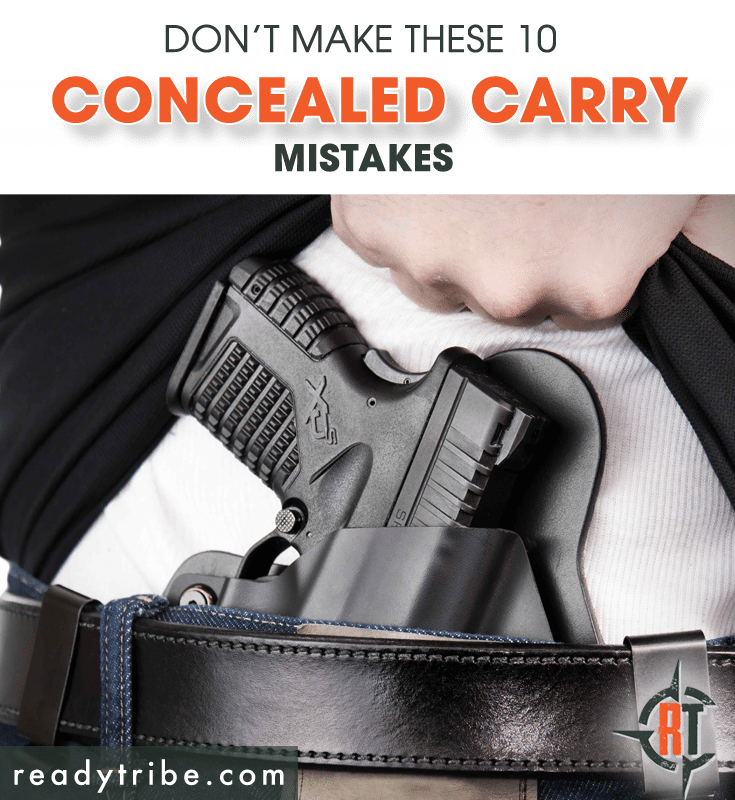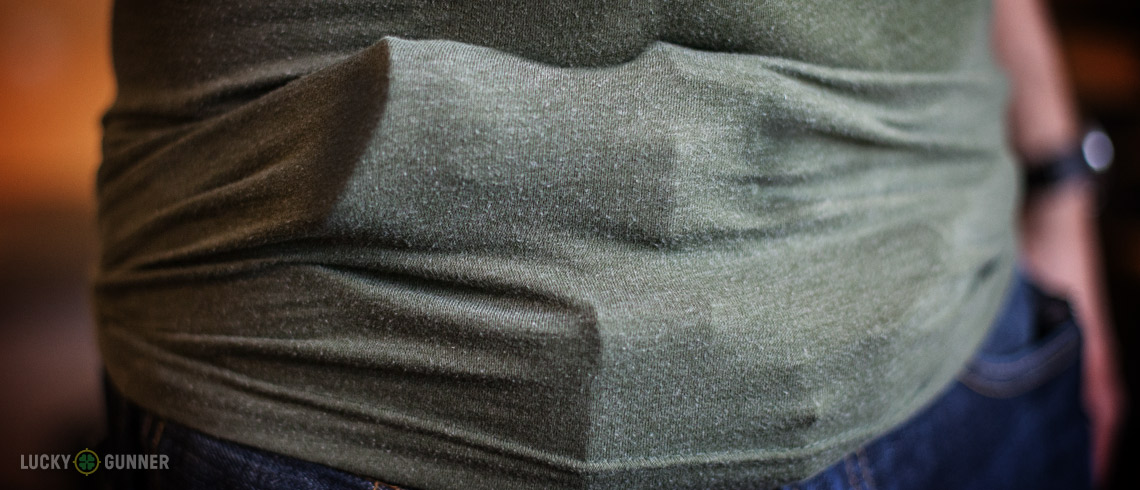Don't Make These 10 Concealed Carry Mistakes

Making the decision to apply for a CCW and carry a concealed firearm does not come without some major responsibilities. Even the slightest mistake while carrying concealed can have huge repercussions and being new to concealed carry is no excuse for making any of the following ten common mistakes. Even people who have been carrying for years can still become complacent and make errors in judgement from time to time.
1. Improper Training
In many states which allow legal concealed carry, you only need to have completed a hunter safety course to qualify for a CCW. While you may be proficient and knowledgeable of rifle safety in the woods, this is no nearly enough training for you to into the real world carrying a concealed firearm on a daily basis.
Make sure you do some research and find a quality concealed carry training course in your area. Look for one that focuses on getting you the real world training you need to carry a concealed weapon, as opposed to some of the courses out there that just want to get you in and out with just the basics. All courses are not created equal. Ask friends and family for recommendations if possible. Training to carry concealed is an ongoing process. Just because you pass a course and have the minimum requirements to obtain your CCW does not mean you are 100% ready for all situations that may arise. Always be working on your physical and mental strategies if you're going to be carrying a concealed firearm.

Related Article: 20 Gun Safety Tips You Should Know
2. Using A Cheap Holster
You can spend a lot of money on a poorly made holster, but you can also find great quality holsters that are inexpensive. Price is not indicative of quality or whether or not it's the right holster for your body type or weapon. No matter what brand or material you end up choosing, make sure it can retain your weapon properly and is comfortable for daily wearing. Try out several styles before you settle on one. Having a proper fitting holster will make a huge difference in keeping your weapon out of sight and comfortable to wear.
3. Exposing/Printing
These are the most common mistakes made not by new concealed carriers, but by complacent ones. Printing is allowing the outline of your gun to appear as it pushes against your clothing. After carrying for some time, it's not likely to happen, but take an extra moment to make sure your clothing fully covers your weapon and that you have it holstered in a location that minimizes the likelihood of printing. If you're new to concealed carry, you are most likely paranoid about anyone noticing your gun that you do everything you can to avoid it. Keep this mentality as you gain experience and you'll be better off in the long run. The average person is fairly unaware of their surroundings anyway. So the chance of someone actually noticing the outline of your gun is small. Wear proper fitting clothing and you should have no issues.
Exposing your weapon inadvertently is a larger problem. It's very possible that if someone notices your gun, they will be scared and call 911. You want to avoid this at all costs. Be careful when bending over or reaching over your head as these are when your weapon is most likely to be visible.

4. Wear The Right Clothing
Wearing the right clothing is extremely important to keep your gun out of view from the public. I'm not saying you need to wear heavy jackets and baggy pants all of the time, but you might want to rethink that slim fit t-shirt. Find a balance between comfort, style and concealment. Darker colors go a long way in minimizing printing.
5. Checking The Gun
This is a common bad habit by most new concealed carriers. It's an odd feeling to have a gun on your hip all the time, so most newbies will routinely check or finger the gun to ensure it's still in place. If you have the right holster, trust me when I say it's not going anywhere. Resist the urge to feel for the gun on a regular basis as it only draws attention to the fact that you are carrying a firearm. With some self control and time, you will not be constantly thinking and worrying about whether or not your weapon is still attached to your body.
6. Practicing With Low Quality Ammunition
There's a saying in the sports world "practice like you play". This means taking your practice as seriously as you would the big game. With firearms, this means using the same high quality ammo on the range that you would load in your daily carry. Test out several different brands of ammunition on the range and see which one your gun likes best. Some ammo just jives better with particular guns. You don't want to find out that your gun likes to jam on a certain type of ammo when your're in a self defense situation.

7. Adjusting Your Holster In Public
This goes along with the fingering/checking your weapon however occasionally your holster might shift after sitting in a vehicle or just from normal movement. Find a private area where you are not in sight of others where you can adjust your holster & weapon back to a comfortable position. This will keep unwanted attention away. Your vehicle, a locked bathroom stall or a dressing room are good places you can use to adjust if you're out in public.
8. Only Carrying Occasionally
It's important that if you're making the commitment to carry a concealed weapon that you do it as much as possible so you become comfortable doing it, not to mention you never actually know when you may need your weapon. It won't do you any good locked up in the safe at home. Carry every time you leave the house. This will ensure you're prepared if you need to defend yourself.
9. Not Knowing Firearm Laws
This is one sure fire way to get yourself into a heap of trouble. Knowing where you can and cannot carry your concealed firearm is equally as important as training to use it in an SD situation. All states and even counties have different sets of laws pertaining to concealed carry. If you're going to be in an unfamiliar area with your weapon, make sure you know the gun laws for that region and strictly abide by them. Take the time to research the laws and your rights regarding your concealed firearm and you'll be a safer, more responsible gun owner.
10. Not Avoiding Conflict
Most citizens who receive a CCW are extremely responsible and take concealed carry very seriously. They have the correct mindset that doing everything possible to avoid conflict is a number one priority. If they do find themselves in a situation where the only option is to use their weapon in self defense, they are prepared to do so. However some individuals who are not as responsible go out of their way to look for trouble or feel that they are invincible because they carry a firearm. This is the worst mentality you could have when it comes to carrying a concealed weapon and is more likely to get you hurt, killed or arrested. Go about your business daily. Be a responsible, respectful citizen and there's a 99.99% chance you'll never have to use your weapon. If you do, it will have been well within your rights and the law to do so.
If you have any other tips for new or even experienced concealed carriers, I would love to hear them. Feel free to post any comments below or on our Facebook page.


